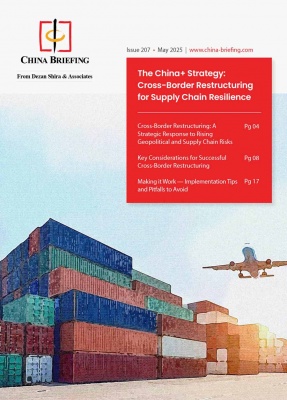China Regulatory Brief: Loosened FDI Regulations, Private Economy Demonstration Zone in Wenzhou
SAFE Releases New Rules for Foreign Exchange Capital Funds Settlement
On April 8, the State Administration of Foreign Exchange (SAFE) released new regulations for settlement of foreign exchange capital funds. Under the new rules, foreign-invested enterprises (FIEs) registered in China will be allowed to make foreign exchange capital account settlement at their own discretion, starting June 1. This means that FIEs in China will be allowed to buy and sell RMB from designated banks in unlimited amounts. SAFE also allows enterprises to freely choose the timing for foreign exchange settlement. The same rules were first implemented in the Shanghai Free Trade Zone (FTZ) in 2013 and further expanded to 16 Chinese main financial reform cities last year. The rules are expected to enable FIEs to better manage and avoid foreign exchange risks.
![]() RELATED: Foreign Exchange FDI Regulations Loosened in the Shanghai FTZ
RELATED: Foreign Exchange FDI Regulations Loosened in the Shanghai FTZ
China to Roll back Preferential Policies for Foreign Investors
China’s State Council recently issued guidelines requiring local governments to roll back their regional tax incentives and preferential policies for foreign-invested enterprises. The Chinese government stated that the move is made to create a fair market and investment environment for both domestic and foreign enterprises. Foreign enterprises including Foxconn, the world’s largest electronics manufacturer, are currently negotiating with local governments to keep previously promised subsidies. Along with lower economic growth, China is now facing a slowdown in tax revenues and massive local debt.
China to Strengthen the Supervision of Fresh Milk Production
China Food and Drug Administration recently released a Circular to strengthen the supervision of the production and sale of fresh milk, stipulating that fresh milk should be processed and sold within the same day. The relevant business operators need to obtain a valid catering service license and have necessary equipment for milk purifying, sterilizing, fermentation and refrigeration. Moreover, the business scope must be limited to the production of pasteurized and fermented milk.
New IP Court Established in the Shanghai FTZ
On April 9, the Shanghai Free Trade Zone (FTZ) officially launched an intellectual property (IP) court, dedicated to handling IP cases. The court will take charge of IP infringement cases incurred in cross-border trade, and import and export procedures. The Chinese government has set up three IP courts in Shanghai, Beijing and Guangzhou in last year, as another step towards a sound IP protection system. For more details on the enhanced legal protection for foreign investors, please refer to our previous article.
Wenzhou to Establish Private Economy Demonstration Zone
The National Development and Reform Commission recently approved the establishment of the Cross-Strait Private Economy Demonstration Zone in the city of Wenzhou, Zhejiang province. The zone is the first of its kind in the nation and will make full use of the local private sector to build itself into an advanced coastal manufacturing base and port logistics base. Wenzhou, among the top five wealthiest cities in China, was the county’s first city to introduce market economy policies and has the most active and developed private economy in China. The city is expected to be built into an important region connecting the Yangtze River delta and Midwest China.
Guangdong Releases Simplified Approval Procedures for Foreign Employees
The Guangdong provincial government recently released simplified approval procedures for foreign employees working in Guangzhou. According to the Circular, the Guangzhou Human Resources and Social Security Department will take charge of the following approval items for foreign employees starting May 1, 2015:
- Employment approval for foreigners working in Guangzhou local government departments
- Employment approval for Taiwan, Hong Kong and Macau personnel working in local government departments
Previously, foreigners working in Guangzhou local government departments would have to obtain the work permit with the Guangdong provincial social security bureau.
|
Asia Briefing Ltd. is a subsidiary of Dezan Shira & Associates. Dezan Shira is a specialist foreign direct investment practice, providing corporate establishment, business advisory, tax advisory and compliance, accounting, payroll, due diligence and financial review services to multinationals investing in China, Hong Kong, India, Vietnam, Singapore and the rest of ASEAN. For further information, please email china@dezshira.com or visit www.dezshira.com. Stay up to date with the latest business and investment trends in Asia by subscribing to our complimentary update service featuring news, commentary and regulatory insight. |
![]()
 Employing Foreign Nationals in China
Employing Foreign Nationals in China
In this issue of China Briefing, we have set out to produce a guide to employing foreign nationals in China, from the initial step of applying for work visas, to more advanced subjects such as determining IIT liability and optimizing employee income packages for tax efficiency. Lastly, recognizing that few foreigners immigrate to China on a permanent basis, we provide an overview of methods for remitting RMB abroad.
 Revisiting the Shanghai Free Trade Zone: A Year of Reforms
Revisiting the Shanghai Free Trade Zone: A Year of Reforms
In this issue of China Briefing, we revisit the Shanghai FTZ and its preferential environment for foreign investment. In the first three articles, we highlight the many changes that have been introduced in the Zone’s first year of operations, including the 2014 Revised Negative List, as well as new measures relating to alternative dispute resolution, cash pooling, and logistics. Lastly, we include a case study of a foreign company successfully utilizing the Shanghai FTZ to access the Outbound Tourism Industry.
 Industry Specific Licenses and Certifications in China
Industry Specific Licenses and Certifications in China
In this issue of China Briefing, we provide an overview of the licensing schemes for industrial products; food production, distribution and catering services; and advertising. We also introduce two important types of certification in China: the CCC and the China Energy Label (CEL). This issue will provide you with an understanding of the requirements for selling your products or services in China.
- Previous Article Nouvelle loi sur la publicité prévue en Chine
- Next Article China Regulatory Brief: Simplified Company Registration Procedures, General Plans of New FTZs Released



























